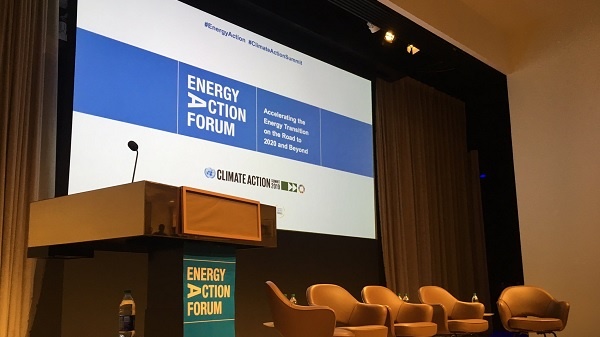
As key partners and climate ambitious countries, Ethiopia and Denmark lead the energy transition track at the UN Climate Action Summit in New York on 23 September on a personal request by UN Secretary-General H.E. António Guterres.
ADDIS ABABA (Royal Danish Embassy in Addis Ababa) – On 23 September at the UN Climate Action Summit, governments, private companies, multilateral development banks, investors and civil society will join forces to boost ambition and to accelerate global climate action. The UN Secretary-General, H.E. António Guterres, has divided the work leading up to the summit into nine different tracks1, each focusing on a specific area where action is needed to achieve the goals of the Paris Agreement on Climate Change. The global shift away from fossil fuels towards green energy such as wind, hydro and solar power is urgent. It is estimated that by 2050, the transition to renewable energy, improved energy efficiency and electrification could contribute up to 90 % of the needed CO2-emission reductions, making energy transition a vital priority for the planet.
Denmark, Ethiopia and Sustainable Energy for All (SEforALL) have been requested to lead the discussions on sustainable energy transition.
“Denmark has through several years, as a valued partner, supported Ethiopia’s ambition to develop a climate-resilient green economy. We share a strong appreciation that renewable energy from hydro, solar, geothermal and wind power will be vital for achieving the Sustainable Development Goal of ensuring affordable, reliable and sustainable electricity for all. Our leadership of the Energy Transition track of the United Nation Climate Action Summit demonstrates our commitment to mobilize global action; in particular for the peoples in the poorest and most vulnerable countries. We have an obligation to leave no one behind.” – Dr. Seleshi Bekele Awulachew, Minister of Water, Irrigation and Energy of the Federal Democratic Republic of Ethiopia
As an integral part of the Energy Transition Track, Ethiopia, Denmark and SEforALL are hosting the “Energy Action Forum” leading up to the summit in New York on 22 September. At this event, 200 high-level stakeholders from governments, businesses, financial institutions and international organizations will gather to accelerate action and push the agenda forward, present ambitious initiatives, share best practices and innovative technologies.
The mobilization of private investments is crucial in the transition towards green energy. Therefore, creating investment-friendly regulatory frameworks is one of the key objectives of the Energy Action Forum. As an example, Denmark is supporting Ethiopia’s Climate-resilient Green Economy Strategy through the Danish Energy Partnership Program by promoting wind power.
“Investing in access to renewable energy means avoid being stuck with fossil fuel investments for decades to come. To set the political direction governments are key. But governments cannot do it alone. Partnerships are needed to engage private sector investors and technology providers of wind turbines and solar panels. Governments need to set ambitious targets; introduce the right framework conditions; and to ensure capacity to develop projects and to attract private investments: It is doable in both developing countries and growth economies. Based on our experience, Denmark collaborates with Ethiopia and other partner countries on applying different models to increase access to wind energy.” – Rasmus Prehn, Minister for Development Cooperation, The Kingdom of Denmark
Background on Danish-Ethiopian Energy partnership
Denmark and Ethiopia are both ambitious in the fight against climate change. A strong government partnership in the field of green energy transition has developed since 2017 with the signing of the AWPGE (Accelerating Wind Power Generation in Ethiopia Program). In 2018, this lead to the financing of the USD200 million 100MW Assela Wind Farm. When complete, the Wind Farm will provide crucial energy diversification in Ethiopia, decreasing the vulnerability towards rainfall irregularities as well as providing green jobs and green energy for years to come.
1‘Energy Transition’, ‘Climate Finance and Carbon Pricing’, ‘Industry Transition’, ‘Nature-based Solutions’, ‘Infrastructure, Cities and Local Action’, ‘Resilience and Adaptation’, ‘Mitigation’, ‘Social and Political Drivers’, and ‘Youth and Public Mobilization’.
